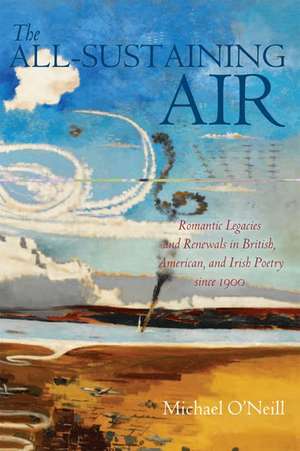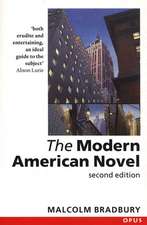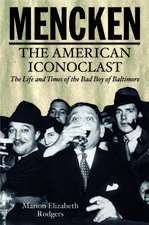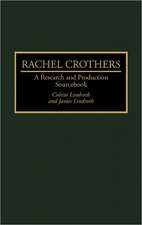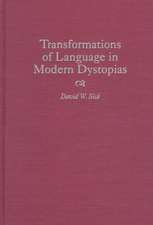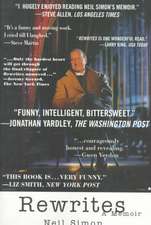The All-Sustaining Air: Romantic Legacies and Renewals in British, American, and Irish Poetry since 1900
Autor Michael O'Neillen Limba Engleză Paperback – 7 noi 2012
Preț: 345.35 lei
Preț vechi: 378.04 lei
-9% Nou
Puncte Express: 518
Preț estimativ în valută:
66.08€ • 69.18$ • 54.68£
66.08€ • 69.18$ • 54.68£
Carte tipărită la comandă
Livrare economică 25-31 martie
Preluare comenzi: 021 569.72.76
Specificații
ISBN-13: 9780199653058
ISBN-10: 0199653054
Pagini: 224
Dimensiuni: 156 x 231 x 13 mm
Greutate: 0.34 kg
Editura: OUP OXFORD
Colecția OUP Oxford
Locul publicării:Oxford, United Kingdom
ISBN-10: 0199653054
Pagini: 224
Dimensiuni: 156 x 231 x 13 mm
Greutate: 0.34 kg
Editura: OUP OXFORD
Colecția OUP Oxford
Locul publicării:Oxford, United Kingdom
Recenzii
Review from previous edition the reader is constantly challenged and delighted
His readings are beyond facile summary, but this is a masterly book from a reader who has an enormous command of twentieth-century poetry alongside a unique and justly renowned insight into the writing of Romanticism.
The All-Sustaining Air...suggests the literary persistence of Romantic norms in British, Irish, and American poetry since the early 1900s, primarily by dwelling on the image of "air." His angle on W. H. Auden, in particular, illustrates the complex and subtle response of modern attempts to renew Romantic lyricism in a post-Romantic world.
[Michael O'Neill] extends his range to more recent poetry in The All-Sustaining Air in finely nuanced readings we have come to expect of him, showing the complexity by which words and associations circulate between texts and among authors... O'Neill offers an exemplary, flexible model and a potent reminder of the value of close reading.
The All-Sustaining Air continues [O'Neill's] commitment to the importance of close reading and sustained attention to the detail of poetics. The book opens with a superb chapter that takes the Romantic use of 'air' and runs with it...The book is as important for Romanticists who neatly divide their own period from what follows as it is for twentieth-century scholars who too lazily read the work of modern poets as rejecting a conservative or bombastic Romantic paradigm.
The influence of Romantic poetry on poets since 1900 is a significant matter... Michael O'Neill is an ideal commentator on this topic. He is convinced of the importance of this relationship for understanding modern poetry, but he is also the most non-reductionist of critics, capable of registering and explicating the unique character of a particular poetic handling or embodiment of theme, in full sensitivity to the interpretive force of form or language ... This book will prove to be essential reading
For a slim book, this is a study of remarkable latitude, and the ambitious range provides The All Sustaining Air its major distinction ... [O'Neill] has published previously on the question of 'Poetry As Criticism', and The All-Sustaining Air succeeds in animating the Bloomian proposition of influence as a form of critical re-writing, with a close attention to the mutuality of disciplines
O'Neill's readings across a great range of poets and poems are wonderfully intricate and sophisticated, inward with the poetry discussed, alert to hidden allusion and predictably subtle about formal choice and nuance.
a stunning array of sophisticated associations to poets and poetic outcomes...The All-Sustaining Air...can sustain ...critique, even invite it, because it succeeds so completely in laying out the lineaments of a tradition and does do by that most convincing of methods, the celebration of the poems that comprise it, through careful, imaginative, even poetic, close readings.
Air, but never hot air, is everywhere in this cleverly written, eloquent book that is so aware of word-play and the cosmos of echoes.
inspiring ... O'Neill ... employs "double responsiveness" by reading poetry "as literary criticism", by allowing the poem to be the "place where the finest and most nuanced reading of a previous poem or poetry occurs" ... One could not wish for a more attuned, erudite guide to these poems than O'Neill.
appealing and suggestive...This excellent book captures the spirit of Romanticism by exploring the ways in which post-Romantic poets, from William Butler Yeats to the present, have used, contested, and reworked Romantic poetry.
[an] absorbing study... a pleasure to read. Its subtitle speaks of "legacies and renewals", and the book's own commitment to renewals of various kinds should ensure it a sustaining afterlife in future studies of Romantic and modern poetry.
One of the distinctive strengths of his study is the way in which the discourses of poetry and literary criticism interpenetrate each other and one of the most prepossessing features of O'Neill's prose style is the way that his literary criticism offers distilled and eloquent evocations of poetry that themselves approach the condition of poetry... O'Neill allows us to see and hear the give and take of literary influence at the level of the line and at the level of the word... the reader is constantly challenged and delighted by the revelation of before unapprehended relations of things. The book is dedicated to Jonathan Wordsworth and it is a splendid tribute to a teacher who wanted, above all, to impart a love of poetry to his students.
a fine demonstration that literary criticism may itself acquire some of the virtues of poetry, and nowhere more compellingly than in its astonishing first chapter ... To read this book is to have one's preconceptions challenged on almost every page. ... It is a book that restores one's faith in literary criticism.
His readings are beyond facile summary, but this is a masterly book from a reader who has an enormous command of twentieth-century poetry alongside a unique and justly renowned insight into the writing of Romanticism.
The All-Sustaining Air...suggests the literary persistence of Romantic norms in British, Irish, and American poetry since the early 1900s, primarily by dwelling on the image of "air." His angle on W. H. Auden, in particular, illustrates the complex and subtle response of modern attempts to renew Romantic lyricism in a post-Romantic world.
[Michael O'Neill] extends his range to more recent poetry in The All-Sustaining Air in finely nuanced readings we have come to expect of him, showing the complexity by which words and associations circulate between texts and among authors... O'Neill offers an exemplary, flexible model and a potent reminder of the value of close reading.
The All-Sustaining Air continues [O'Neill's] commitment to the importance of close reading and sustained attention to the detail of poetics. The book opens with a superb chapter that takes the Romantic use of 'air' and runs with it...The book is as important for Romanticists who neatly divide their own period from what follows as it is for twentieth-century scholars who too lazily read the work of modern poets as rejecting a conservative or bombastic Romantic paradigm.
The influence of Romantic poetry on poets since 1900 is a significant matter... Michael O'Neill is an ideal commentator on this topic. He is convinced of the importance of this relationship for understanding modern poetry, but he is also the most non-reductionist of critics, capable of registering and explicating the unique character of a particular poetic handling or embodiment of theme, in full sensitivity to the interpretive force of form or language ... This book will prove to be essential reading
For a slim book, this is a study of remarkable latitude, and the ambitious range provides The All Sustaining Air its major distinction ... [O'Neill] has published previously on the question of 'Poetry As Criticism', and The All-Sustaining Air succeeds in animating the Bloomian proposition of influence as a form of critical re-writing, with a close attention to the mutuality of disciplines
O'Neill's readings across a great range of poets and poems are wonderfully intricate and sophisticated, inward with the poetry discussed, alert to hidden allusion and predictably subtle about formal choice and nuance.
a stunning array of sophisticated associations to poets and poetic outcomes...The All-Sustaining Air...can sustain ...critique, even invite it, because it succeeds so completely in laying out the lineaments of a tradition and does do by that most convincing of methods, the celebration of the poems that comprise it, through careful, imaginative, even poetic, close readings.
Air, but never hot air, is everywhere in this cleverly written, eloquent book that is so aware of word-play and the cosmos of echoes.
inspiring ... O'Neill ... employs "double responsiveness" by reading poetry "as literary criticism", by allowing the poem to be the "place where the finest and most nuanced reading of a previous poem or poetry occurs" ... One could not wish for a more attuned, erudite guide to these poems than O'Neill.
appealing and suggestive...This excellent book captures the spirit of Romanticism by exploring the ways in which post-Romantic poets, from William Butler Yeats to the present, have used, contested, and reworked Romantic poetry.
[an] absorbing study... a pleasure to read. Its subtitle speaks of "legacies and renewals", and the book's own commitment to renewals of various kinds should ensure it a sustaining afterlife in future studies of Romantic and modern poetry.
One of the distinctive strengths of his study is the way in which the discourses of poetry and literary criticism interpenetrate each other and one of the most prepossessing features of O'Neill's prose style is the way that his literary criticism offers distilled and eloquent evocations of poetry that themselves approach the condition of poetry... O'Neill allows us to see and hear the give and take of literary influence at the level of the line and at the level of the word... the reader is constantly challenged and delighted by the revelation of before unapprehended relations of things. The book is dedicated to Jonathan Wordsworth and it is a splendid tribute to a teacher who wanted, above all, to impart a love of poetry to his students.
a fine demonstration that literary criticism may itself acquire some of the virtues of poetry, and nowhere more compellingly than in its astonishing first chapter ... To read this book is to have one's preconceptions challenged on almost every page. ... It is a book that restores one's faith in literary criticism.
